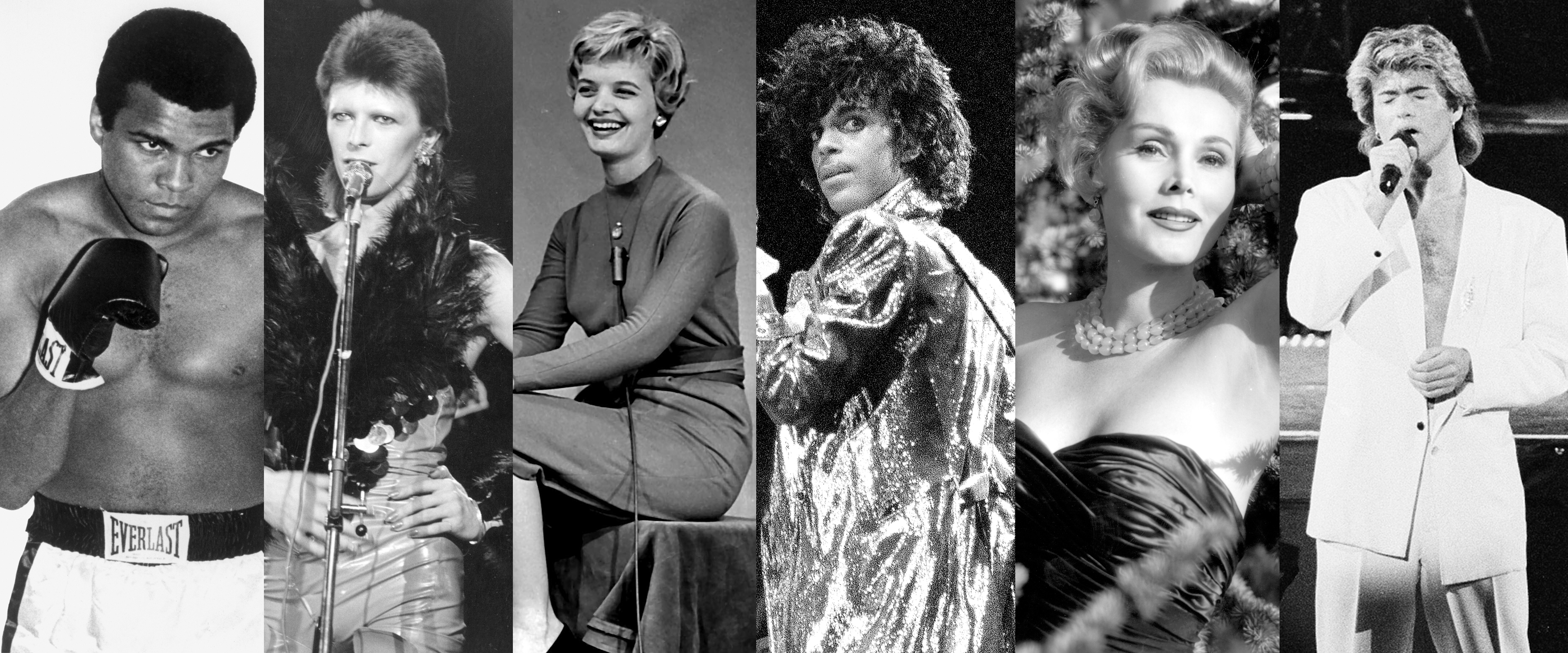A requiem for 2016: Music to remember the year's many fallen stars
The dead can't speak, but they can go on singing as long as people remember their music


A free daily email with the biggest news stories of the day – and the best features from TheWeek.com
You are now subscribed
Your newsletter sign-up was successful
So many historical figures and famous artists died in 2016, we often had to be reminded that years do not kill people.
Every facet of public life saw prominent losses: John Glenn, Fidel Castro, Antonin Scalia, Shimon Peres, Boutros Boutros-Ghali, and Nancy Reagan in politics; Muhammed Ali, Arnold Palmer, Gordie Howe, and Pat Summitt in sports; Harper Lee, Umberto Eco, Edward Albee, Dario Fo, and Elie Wiesel in letters; Morley Safer, John McLaughlin, and Gwen Ifill in news broadcasting; and actors Gene Wilder, Carrie Fisher, Alan Rickman, Garry Shandling, Garry Marshall, Abe Vigoda, Patty Duke, Alan Thicke, Zsa Zsa Gabor, and Florence Henderson; among far too many others.
But music took a particularly brutal hit in 2016. From David Bowie dying in the first two weeks of the year to George Michael's death in the final two weeks, in every month and across all genres, the world lost musical innovators and poets, superstars and unsung heroes, prodigies and late bloomers, singers who made hearts melt and hands that made the music sing from behind the scenes. Here's a look back at some of the musical lights that burned out in 2016, and a sampling of their brilliance that shines on.
The Week
Escape your echo chamber. Get the facts behind the news, plus analysis from multiple perspectives.

Sign up for The Week's Free Newsletters
From our morning news briefing to a weekly Good News Newsletter, get the best of The Week delivered directly to your inbox.
From our morning news briefing to a weekly Good News Newsletter, get the best of The Week delivered directly to your inbox.
David Bowie (died Jan. 10 at age 69)
Bowie was a musical and fashion pop chameleon whose trailblazing 40-year career lasted until the very end — his final album, Blackstar, shot to No. 1 after his death. The tributes to Bowie all seemed to lean on the great "Life on Mars," but "Ashes to Ashes" (1980) captured a turning point in his life and his musical direction.
Glenn Frey (died Jan. 18 at age 67)
As half of the creative force behind the Eagles, Frey co-wrote some of the most memorable songs of the 1970s, including "Hotel California," "Take It Easy," "Lyin' Eyes," and "Desperado." But he also had a successful solo career, including the song "You Belong to the City" for the show Miami Vice, and the theme to Beverly Hills Cop, "The Heat is On" (1984).
A free daily email with the biggest news stories of the day – and the best features from TheWeek.com
Maurice White (died Feb. 3 at age 74)
White was leader and co-founder of the funk-soul group Earth, Wind & Fire, which scored some big records in the 1970s. This one, "September" (1978), got its inspiration from doo-wop, and along with White's singing, it features the Phenix Horns and falsetto crooning from Philip Bailey.

George Martin (died March 8 at age 90)
Sir George Martin is most famous for signing the Beatles to their first record contract and helping shape their sound — and thus the sound of popular music. His final project was the documentary SoundBreaking, and in this short clip compiled from the series, Martin starts to explain how he convinced Paul McCartney to add strings to "Yesterday," shifting how the Beatles recorded and wrote their songs.

Keith Emerson (died March 11 at age 71) and Greg Lake (died Dec. 7 at age 69)
Two thirds of the prog-rock luminaries Emerson, Lake, & Palmer died in 2016, nine months apart. ELP was known for reworking classical pieces and embarking on extended works of virtuosity. This is the title track to their 1972 album Trilogy, and it showcases Lake's vocals for the first two and a half minutes, then Emerson's piano and synth pyrotechnics, and finally Carl Palmer's percussion.
Frank Sinatra Jr. (died March 16 at age 72)
Sinatra spent much of his life in the shadow of his famous father, including conducting Frank Sinatra Sr.'s band on his final tours. But Frank Sinatra Jr. also had a singing career of his own, and he was on tour singing the songs his father made famous when he died of a heart attack. This slightly groovy version of the standard "Love For Sale" is from Sinatra Jr.'s debut album, Young Love For Sale (1965), and rarely has Cole Porter's ballad about a down-on-her-luck prostitute sounded so upbeat.

Merle Haggard (died April 6 at age 79)
Haggard was one of the leading figures in the Outlaw Country subgenre, along with Willie Nelson and Waylon Jennings, and also a pioneer along with Buck Owens of the "Bakersfield Sound," a reaction to the slicker and more string-heavy Nashville sound of the 1950s. Haggard's "Okie From Muskogee" (1969) is not only one of his best-known songs, but also one of his more enigmatic. Is he trashing the 1960s counterculture or covertly celebrating it?

Prince (died April 21 at age 57)
The death of Prince Rogers Nelson was one of the bigger musical shocks of 2016, both because of his age and the immense musical legacy he leaves behind. A pop icon and musician's musician, Prince was posthumously honored with countless renditions of "Purple Rain," but "7" (1992) stands up there with his great anthems.
Billy Paul (died April 24 at age 80)
Soul and jazz singer Billy Paul was essentially a one-hit wonder, but what a hit it was. "Me and Mrs. Jones" (1972) was enough to beat Ray Charles for an R&B Grammy, and the ode to marital infidelity still stands tall today.
Bill Backer (died May 13 at age 89)
Backer was, first and foremost, an ad man. But his visionary TV commercial for Coca-Cola in 1971, featuring a song he wrote, went on to become one of the most recognizable songs from the 1970s, and a hit for the New Seekers in 1972, who only changed a few words to excise the word Coke.
Guy Clark (died May 17 at age 74)
Clark was a Texas troubadour most famous for a song he wrote about a stint in Los Angeles, "L.A. Freeway." "Desperadoes Waiting For a Train" (1975), Clark's other best-known song, was a hit for Jerry Jeff Walker before Clark recorded his own version, and it became one of his most frequently covered songs. Here he is singing it at Austin City Limits in 1990.
Marni Nixon (died July 24 at age 86)
Nixon is one of the most famous singers you have probably never heard of, the "ghost" soprano most famous for dubbing the songs of lead actresses in musicals made into movies, like Deborah Kerr in The King and I, Natalie Wood in West Side Story, and Audrey Hepburn in My Fair Lady. Nixon also appeared briefly as one of the nuns in The Sound of Music — Julie Andrews sang her own parts — and you can hear some of Nixon's best known (often unknown) performances in the clip below.
Jean Shepard (died Sept. 25 at age 82)
Shepard, among the most famous women from the Bakersfield Sound era, sang about independent women in a genre that was only just becoming open to female stars. Her first hit, "Dear John Letter," was also the first country success from Bakersfield, and she kept on recording until 1981. "Second Fiddle (To an Old Guitar)" kicked off an early career comeback when her star had been fading, and she kept performing until retiring in 2015, on the night she celebrated becoming the first woman to be a member of the Grand Ole Opry for 60 straight years.
Sir Neville Marriner (died Oct. 2 at age 92)
Marriner was a violinist who started a chamber group, the Academy of St. Martin in the Fields, and went on to become one of the most accomplished and best-selling conductors of the 20th century. Marriner can be seen conducting Mozart's Piano Concerto No. 20 in April 2014, in this remembrance from the academy he founded.

Leonard Cohen (died Nov. 7 at age 82)
Cohen is one of popular music's greatest poets, and his most enduring song — though not his only masterpiece — is "Hallelujah" (1984), an anthem of the sacred and profane that Cohen needed some help boosting to worldwide hit. Since John Cale and Jeff Buckely covered the song in the early 1990s, more than 300 other performers have put their stamp on the song. Here is Cohen himself singing it in 2008, near the start of a marathon 2008-2013 nonstop tour that took the Canadian legend around the world one last time.
Leon Russell (died Nov. 13 at age 74)
Russell was a genre-spanning songwriter and sideman who played with everyone from Jerry Lee Lewis to the Beach Boys, Bob Dylan to Frank Sinatra and the Rolling Stones. His own debut album, in 1970, had help from Eric Clapton, George Harrison, and Ringo Starr, and it included "A Song for You," which has been covered by more than 100 recording artists. Elton John considers Russell a mentor of sorts, and you can hear shades of "Your Song" in this performance.
Sharon Jones (died Nov. 18 at age 60)
Jones was late to stardom — she didn't release her first record until age 40, after a career as a prison guard and armored car driver, as well as some work singing backup — but the soul and funk singer made up for lost time, releasing her first album as lead singer of the Dap-Kings in 2002. Their 2014 album Give the People What They Want, was nominated for a Grammy. This is the title track of the 2007 Sharon Jones & the Dap-Kings record 100 Days, 100 Nights.
George Michael (died Dec. 25 at age 53)
Michael rose to international stardom as half of the pop group Wham!, famous for effervescent hits like "Wake Me Up Before You Go-Go," "Everything She Wants," and "Freedom." Michael began striking out on his own with "Careless Whisper," sold as a George Michaels single in Europe and a Wham! song in the U.S. His debut album, Faith, sold more than 20 million copies, and showed Michael to be a deeper-than-expected talent — he wrote, produced, and played a lot of the instruments on the album. The video for the title song, "Faith," starts out with the beginning of the album's most controversial song, "I Want Your Sex," and also an organ version of the Wham! song "Freedom," as well as a slow shot of Michael's derrière.
There are few bad songs on Faith, and here's one of the album's ballads. Michael clearly poured his heart and soul into "One More Try." "I'm looking out for angels, just trying to find some peace," he sings, adding later, "Teacher, there are things that I don't want to learn."
That's a pretty good summation of 2016.

Peter has worked as a news and culture writer and editor at The Week since the site's launch in 2008. He covers politics, world affairs, religion and cultural currents. His journalism career began as a copy editor at a financial newswire and has included editorial positions at The New York Times Magazine, Facts on File, and Oregon State University.
-
 History-making moments of Super Bowl halftime shows past
History-making moments of Super Bowl halftime shows pastin depth From Prince to Gloria Estefan, the shows have been filled with memorable events
-
 The Washington Post is reshaping its newsroom by laying off hundreds
The Washington Post is reshaping its newsroom by laying off hundredsIn the Spotlight More than 300 journalists were reportedly let go
-
 Quiet divorces are sneaking up on older couples
Quiet divorces are sneaking up on older couplesThe explainer Checking out; not blowing up
